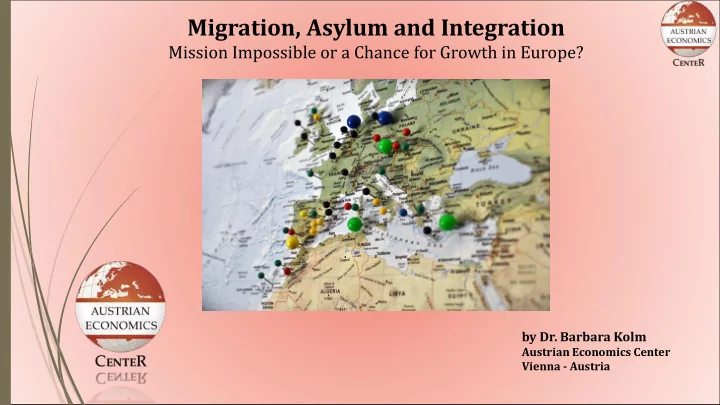

Migration, Asylum and Integration Mission Impossible or a Chance for Growth in Europe? by Dr. Barbara Kolm Austrian Economics Center Vienna - Austria
Structure Current situation: Facts and Figures How many? From where? Where to? Why? Distinguishing between asylum seekers, guest workers and economic refugees Economists’ view on migration Effects on wages, crime, dynamics and expenditure Moral arguments Cultural issues A (short) history of migration Policy recommendations Conclusion
Asylum Applications Number of asylum seekers up to the third quarter of 2015 Source: Eurostat
Current Situation: Facts and Figures Around 660.000 asylum applications in 2014 In 1992: 697,085 applications Situation is not unprecedented (balkan wars) 800.000 asylum seekers expected in 2015 Largest influx of migrants on European territory yet How will this trend continue in light of current geopolitical developments? More than 2600 people drowned in the Mediterranian (2015) Huge loss of human potential (Role of EU!) Refugee: “a person who is outside his or her country of nationality or habitual residence; has a well-founded fear of being persecuted because of his or her race, religion, nationality, membership of a particular social group or political opinion. ” ( UN Convention relating to the status of refugees 1951) Not all migrants qualify as refugees!
Migration routes & countries of origin and destination Source: Eurostat
Where do asylum seekers come from? Source: Eurostat
Illegal border crossing into the EU Source: Eurostat
Asylum seekers accepted in 2014 50.000 45.000 40.000 35.000 30.000 25.000 20.000 15.000 10.000 5.000 0 Germany Sweden France Italy Switzerland United Netherlands Bulgaria Hungary Ireland Kingdom Source: Eurostat
Where have Syrian fled to? 2.250.000 1.938.999 1.750.000 1.250.000 1.113.941 750.000 629.245 348.540 249.463 250.000 132.375 Turkey Lebanon Jordan Europe Iraq Egypt -250.000 Source: UNHCR (Data since 2011)
Economists ’ Views on Migration Migration barriers as barricades for global prosperity Movement to places where productivity is highest The need for Immigration in present western democracies Demographic shifts Unsustainable government debts & social security schemes Migrants can help there! Moral Arguments A right to migrate? UN Convention relating to the status of refugees (1951) Article 14 of the 1948 Universal Declaration of Human Rights
Economists ’ views on Migration Ludwig v. Mises (1927): “ When liberalism arose in the eighteenth and nineteenth centuries, it had to struggle for freedom of emigration. Today the struggle is over freedom of immigration. ” Ben Powell: “ Migrants boost size of economy, expand work force, enhance specialization and divison of labour and raise productivity, but might put increased pressures on welfare states, if administered badly. ” Workplace integration takes way too long: After 5 years: 50% of refugees join the workforce (Austria) After 8 years: 80% of refugees join the workforce (Austria)
Economists ’ Views on Migration Migrant‘s effect on public finances Controversial discussion: Hans Werner Sinn‘s critique (each migrant costs 1.800 € p.a.) But: Contributions to the budget, without claims to the social security benefits Probably depends on how migration is administered Migrant‘s effect on wages - Complementarity of skills (migrants are usually either very low- or high-skilled) - In times of mass-immigration of low-skilled workers, working- class wages might decline temporarily in the long run higher wages and living standards are available for everyone
Economists‘ Views on Migration Dynamism Migrants might awake sclerotic, unentrepreneurial and ageing societies Crime Average immigrant is not more likely to be a criminal than the average person Migrants can be deported in case of delinquency Cultural Issues Values? Western Culture? - How quickly does the assimilation take place? Danger of Parallel Societies? - If migrants predominately come from one or several cultural backgrounds.
A (very) short History of Migration Migration is nothing new History of mankind as a history of migration Recent intensification of migration Great record of USA Basically open borders until 1918 Free, dynamic and prosperous society Success of the Schengen Area - Rudimentary form of competition between nations states - People voting with their feet (Romania, Bulgaria) 1620 2005
Policy Recommendations Effects of migration depend on how it is administered Inclusion of migrants into labour markets Refrain from pushing them into the welfare state (!) Welfare moratorium? Try to have migration from culturally diverse backgrounds Democratic deficiencies in the way Europe deals with the crisis More private accomodation of refugees (Sponsor your Migrant!) Costs should be (at least partially) bourne by those people that are willing to accept refugees; Referenda on the issue.
Conclusion Challenging situation for Europe Economists agree that migration is largely a force to the good Successful dealing with migrants will depend on their integration into labour markets Refrain from pushing them into the welfare state More democratic participation on the issue Free market policies also work with respect to migration!
Annual Charity Gala of the Friedrich A. v. Hayek Institut Peter Thiel: 2015 Hayek Lifetime Achievement Award November 10, 2015 Palais Liechtenstein (Vienna)
Thank you for your attention! Dr. Barbara Kolm b.kolm@austriancenter.com www.austriancenter.com
Recommend
More recommend